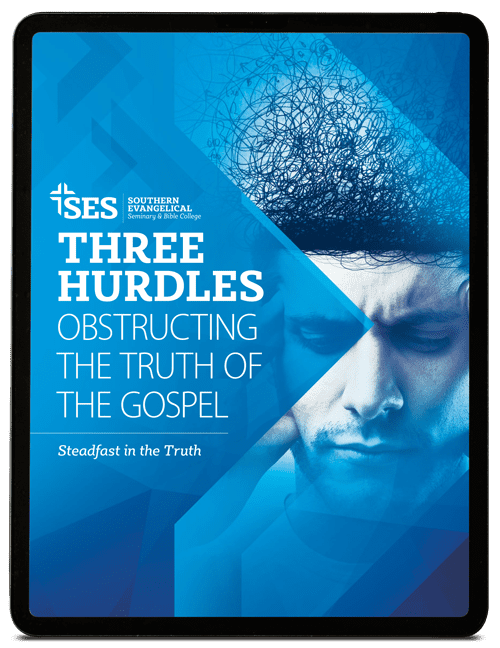This article is in response to this piece from The Gospel Coalition. As a past TGC contributor, as an act of good faith, I did express my concerns directly to TGC before posting my article here.
**Update** The Gospel Coalition was gracious to publish a condensed version of my article on their site.
No, Martin Luther Was Not a Deconstructionist. And neither was Jesus.
Many years ago, my Christian beliefs were challenged intellectually by a progressive Christian pastor. It threw me into deconstruction that took several years to fully come out of. I would find out later that he himself had already deconstructed and had hoped to propel his congregation into deconstruction so he could convert them to progressive Christianity. He was very good at it. In fact, he was almost totally successful. A few of us came back around to a historically Christian understanding of the gospel, but most did not.
Because of this, when “deconstruction stories” started popping up in my social media newsfeed, along with hashtags like #exvangelical and #deconstruction, I paid attention. I’ve been following along… seeking to understand what people mean by those words.
I witnessed a hashtag turn into a movement.
As of today, there are 293,026 posts on Instagram utilizing the hashtag #deconstruction. The vast majority are from people who have either deconverted from Christianity, become progressive Christians, embraced same-sex marriage and relationships, rejected core historic doctrines of the faith,and/or are on a mission to crush the white Christian patriarchy. There are a few photos of deconstructed clothing (apparently this is a thing?) and a scant few sneaky posts from evangelicals attempting (mostly unsuccessfully) to convince the deconstructors that Jesus is the way. A plethora of insults, mockery, and anger are hurled at the church, along with memes stating, “I regret saving myself for marriage,” and “Good morning! It’s a great day to leave your nonaffirming church.”
Online, there are countless deconstruction therapy and counseling sites which will facilitate your deconstruction and reconstruct you with mindfulness or the contemplative practices of progressive Christian favorites like Richard Rohr. There are conferences you can attend, one for which I personally paid good money (for research purposes) to be taught how to break free from toxic religion, reject Christian dogma, and learn to embrace what basically added up to warmed-over Buddhism.
Phil Drysdale, a deconstructed Christian and deconstruction researcher asked people on Instagram to name the accounts that have helped them through their deconstructions. A quick scroll reveals that the leaders and guides the vast majority are looking to are accounts/people like Lisa Gungor, Audrey Assad, God is Grey, Jesus Unfollower, Your Favorite Heretics, Jo Luehmann, The Naked Pastor, and a plethora of others dedicated to providing a space for Christians to examine, reinterpret and/or abandon their beliefs. None of these accounts are encouraging Christians to look to Scripture as the authority for truth.
My Kingdom for a Definition
In my book, Another Gospel: A Lifelong Christian Seeks Truth in Response to Progressive Christianity, which chronicles my own deconstruction journey, I define deconstruction this way:
In the context of faith, deconstruction is the process of systematically dissecting and often rejecting the beliefs you grew up with. Sometimes the Christian will deconstruct all the way into atheism. Some remain there, but others experience a reconstruction. But the type of faith they end up embracing almost never resembles the Christianity they formerly knew.
I would add that it rarely retains any vestiges of actual Christianity.
Over the past year or so, it has become common for Christian leaders to begin to refer to deconstruction as something potentially positive. I get it. When I first heard that take, I thought, “Hmmm. That could work. Just deconstruct the false beliefs and line up what you believe with Scripture.” I was operating from the foundational belief that objective truth exists and can be known. But as I continued to study the movement, this understanding of deconstruction became untenable.
That’s because the way the word is most often used in the deconstruction movement has little to do with objective truth, and everything to do with tearing down whatever doctrine someone believes is morally wrong. Take, for example, Melissa Stewart, a former Christian now agnostic/atheist with a TikTok following of over 200k. She describes how lonely and isolated she felt during her own deconstruction, and how discovering the #exvangelical hashtag opened up a whole new world of voices who related with what she was going through. Her TikTok platform now gives her the opportunity to create that type of space for others. In an interview on the Exvangelical Podcast, she commented on the deconstruction/exvangelical online space:
My biggest experiences with it were people talking about what they went through—their stories—and it was very personal and it focused on the human beings who have come out of this, rather than on whether a certain kind of theology is right or wrong.
In my experience studying this movement, I think she nails it on the head. Deconstruction is not about getting your theology right. It’s built upon a postmodern-ish embrace of moral relativism. For example, if your church says a woman can’t be a pastor, the virtuous thing to do would be to leave that church and deconstruct out of that toxic and oppressive doctrine. Deconstructionists do not regard Scripture as being the final authority for morality and theology—they appeal primarily to science, culture, psychology, sociology, and history.
A Life of Its Own
Now, the narrative is evolving. I’m seeing more and more posts, including the previously mentioned Gospel Coalition article, that portray Martin Luther and even Jesus himself as deconstructionists. This, in my view, is inherently irresponsible. If deconstruction means nothing more than changing your mind, or correcting bad ideas, then I can say I deconstructed by switching from AT&T to Verizon. Martin Luther was trying to reform the church to get back to Scripture. This is most certainly not what the deconstructionists are doing. In most cases, the Bible is the first thing to go. And when people put Jesus in the deconstruction camp…it’s unclear whether they mean he deconstructed his own views or he deconstructed the views of others. Either way, it’s seriously problematic. Deconstruction is not an appropriate term to use in these contexts.
It’s as if all of the sudden no one knows what the word means anymore, and they are somehow trying to redeem it or co-opt it to represent something like changing your mind or reforming your faith. Some in the deconstruction movement will argue that the current iteration of deconstruction is not to be conflated with the postmodern philosophy of Jacque Derrida, who is often referred to as the “Father of Deconstruction.” But I’m not convinced. Ultimately, Derrida didn’t believe that words could be pinned down to singular meanings. James Lindsay and Helen Pluckrose put it like this: “For Derrida, the speaker’s meaning has no more authority than the hearer’s interpretation and thus intention cannot outweigh impact.”[i]
Of course, for Derrida deconstruction had to do with text and words, not necessarily the dismantling of one’s faith. But it’s only a short jump from deconstructing the text of the Bible (which, I would argue, is typically the first stop on the path to deconstruction as it is manifesting today) to the complete unraveling of one’s orthodox Christian beliefs.
Here’s the irony. If we attempt to completely detach current deconstruction from Derrida and define it subjectively, we are literally deconstructing the word “deconstruction” a la Derrida. Why are we trying to co-opt a word and spin it into a positive? And if the meaning of the word deconstruction signifies any number of different things, at best we will be equivocating. At worst, we will have bought into the assumptions of postmodernism hook, line and sinker.
Matt Chandler is Right
Recent comments by Matt Chandler have made the rounds in which he characterized deconstruction as “the sexy thing to do,” hitting on the almost trendy type of cool factor the word now carries. Aside from giving the deconstructionists endless opportunities to make him the butt of their “Matt Chandler thinks I’m sexy!” jokes and memes, his comments (along with the recent comments by John Cooper of Skillet) have revealed that many Christians are using this one word in profoundly different ways. For example, Relevant magazine claims Chandler and Cooper have a “fundamental misunderstanding” of deconstruction. I disagree. I admit I’ve had a few quibbles with points Matt Chandler has made in recent years. But on this I think he understands something they don’t. He links deconstruction with the postmodernism of Derrida, and in a subsequent Instagram post, commented, “Deconstruction doesn’t mean doubt or theological wrestle or struggling through church hurt.” (All things he said he’s been through and has tons of mercy for.) I think he’s dead right.
We are Christians, and we should be deriving our vocabulary and categories from Scripture. I see nowhere in the Bible where anything like the current movement of deconstruction is promoted or condoned. I propose we leave it with Derrida and instead use biblical words and categories like doubt, reformation, discernment, and even sometimes, (gasp!) apostasy.
Let’s save deconstruction for what it presents itself to be. Here are some characteristics to look for if you think you might be deconstructing:
1. Some type of moral relativism is assumed, whether explicitly or implicitly. If Scripture is your authority, you are not deconstructing. That doesn’t mean you’re not struggling deeply with doubt, seeking healing from church abuse, or have profound confusion over what it means to be a Christian.
2. You are detaching from the body of Christ and seeking only the community of others who are also in deconstruction. If you are working through your doubts and questions in community with other believers, or at least have the intention of doing so, you are not deconstructing. Sometimes this will mean leaving an unbiblical church environment for a time, with the goal of finding a healthy one.
3. You are looking to non-Christian religious philosophies, history, or sociology—rather than Scripture— to determine authentic Christianity. Not that things like history and sociology are without merit, but if you are honestly seeking to derive your religious beliefs from Scripture, you are not deconstructing.
This doesn’t mean there’s no hope if you find yourself in actual deconstruction. Ten years ago, I found myself spiraling into deconstruction, and God in his unfathomable mercy and faithfulness led me out.
Let’s not Deconstruct Deconstruction
As Christians, we tend to protest when progressives and secularists take words and phrases like “love,” “tolerance,’ “biblical inspiration,” and “incarnation” and change the definitions to suit their preferences. Let’s not do the same with deconstruction.
Deconstruction has taken on a life of its own, and now is the time to be extremely careful to define our words accurately. After all, if the word means everything, then it means nothing, yet it carries the potential to suck unsuspecting Christians into a very dangerous vortex of ideas from which they might not return.
Originally published here.

Download Your FREE eBook!
- Reading Books and Listening to Talks is Not Enough
- Not All Apologetics Methods Are Created Equally
- A Degree is More Than a Piece of Paper






